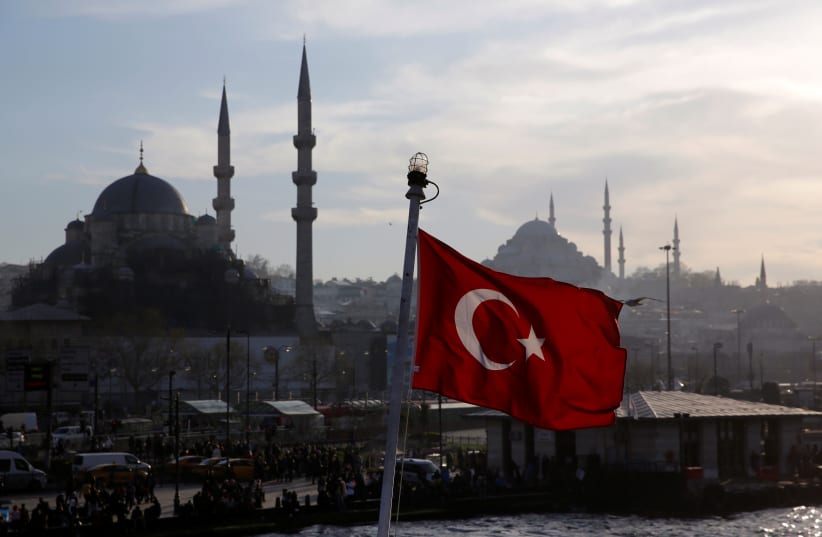Moscow has been reinforcing its troops on Ukraine’s eastern border, where pro-Russian separatists have been fighting Kyiv’s military since 2014.
In his meeting with President Volodymyr Zelensky in Istanbul on Saturday, Turkish President Recep Tayyip Erdogan said he supported Ukraine’s territorial integrity while Zelensky said their views on regional threats coincided.
Timothy Ash, an economist with a focus on Turkey and Ukraine, said Erdogan’s meeting with Zelensky will help to boost his relations with US President Joe Biden. Ash expects a phone call will be held soon between the two leaders, something the Turkish leader has sought since Biden entered office in January.
“Erdogan has taken one on the chin,” Ash said. “I think that will be understood in Washington.”
Moscow announced on Monday that it would limit flights to Turkey until June, two days after Erdogan met with and expressed support for his Ukrainian counterpart.
The Kremlin denied the move to limit flights was connected to the meeting and cited Turkey’s increase in COVID-19 cases.
However, Ash told The Media Line, “I think this decision was entirely based on geopolitics and Putin’s attempt to isolate Ukraine. Everything Putin does is strategic.”
While Erdogan has been trying to move Turkey closer to Russia, including via an arms deal, the two governments have major differences.
For example, they are on opposing sides in Syria, with the Kremlin supporting President Bashar Assad, including with air force units that have caused the deaths of Turkish soldiers.
Soner Cagaptay, the author of “Erdogan’s Empire: Turkey and the Politics of the Middle East,” called the flight restrictions Russia’s “warning shot” and said Russian President Vladimir Putin could soon place limits on agricultural imports from Turkey, subtracting a few more percentage points from the country’s economic growth.
The move also would subtract “more than a few” percentage points from Erdogan’s support base, he told The Media Line.
Cagaptay, director of the Turkish Research Program at the Washington Institute for Near East Policy, added that Ankara is keen to work with the US and expects the two sides to deepen ties, including on Ukraine.
Turkey’s support for Ukraine goes beyond rhetoric. Ankara has provided Kyiv with drones that helped the embattled country face separatist forces accused of getting support from Russia.
Turkey is especially sensitive to flight restrictions, since a significant portion of its GDP comes from tourism and Russia is its largest source of foreign visitors.
Last year, more than 2 million Russians visited Turkey.
Trade with Turkey’s Western allies also plays a major role in the country’s economy, which had been struggling well before the coronavirus pandemic.
Since the pandemic, tourism has seen a major drop and Turkey’s currency, the lira, recently fell even further after Erdogan removed the country’s respected central bank governor.
Erdogan knows well the possible fallout from citizens’ ailing finances, as evidenced by his Justice and Development Party’s loss in the 2019 Istanbul mayoral election, the greatest defeat for the president since he came to power.
Analysts say financial concerns and a sense of regional isolation now has Erdogan on a charm offensive with Turkey’s Western allies.
After tensions in the Eastern Mediterranean led to fears of an accidental clash with Greece, Ankara restarted talks with Athens. A meeting with the Greek foreign minister is scheduled for Thursday.
But no ally is more important than the US.
The economic troubles that led to the Istanbul mayoral defeat were sparked by a diplomatic row with Washington, which led to sanctions on Turkey and a free fall of its currency.
On Saturday, Turkey announced that two US warships would cross into the Black Sea where Ukraine and Turkey have long coastlines, a high-profile show of Ankara’s support for NATO in the Ukraine conflict.
However, as Erdogan’s popularity wanes at home, his focus will be on how these relations will help his country’s economy as citizens struggle with rising inflation and unemployment.
Atilla Yesilada, an Istanbul-based economist, said the economy and the pandemic will take precedence over foreign policy.
“Unless Mr. Erdogan solves those two problems, whatever he does abroad doesn’t have any meaning, it doesn’t give him any votes,” Yesilada told The Media Line.
